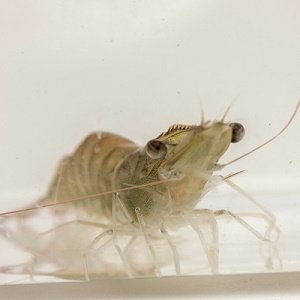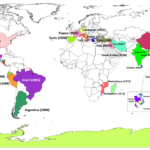White Spot disease caused by White Spot Syndrome Virus (WSSV) is one of the world’s most notoriously feared infectious agents in the shrimp industry, inflicting estimated production losses world-wide of up to US$1 billion annually. It moves quickly, killing up to 100% in affected farmed shrimp.
Now, Queensland biotech success story, Genics’ technology has been shown to exceed the standards and parameters for efficiency and sensitivity in commercial shrimp pathogen tests. Pathogen testing is the most effective way farmers can rapidly assess their animals and farms for WSSV incursion.
Global testing standards for the devastating white spot virus are currently set by the World Organisation for Animal Health (WOAH), and Australia’s national science agency, CSIRO.
Dr Melony Sellars, inventor of Shrimp MultiPath™ technology, and CEO of Genics said, “I am pleased to share the latest peer reviewed research findings, published by the prestigious Diseases of Aquatic Organisms, supporting the market leading capability of Genics Shrimp MultiPath™ technology.
“Not only are we benchmarking against world standard testing real-time PCR assays, but also exceeding these parameters, meaning we are supplying our industry with higher efficiency and value for money with cutting-edge technology against white spot and the 12 other pathogens of commercial importance in the platform.
“While WSSV continues to wreak havoc in emerging and established industries and local environments, it’s rewarding to know Australian scientific know-how is working to bring effective solutions to a terrible challenge worldwide. Ultimately, with widespread use of these tests in early pathogen detection, we can support those farmers working to improve food security.”
Shrimp are well known for their high volumes of protein, amino acids and healthy fats making them an important part of our world’s sustainable food supply. Unfortunately, these invertebrates can also contract numbers of deadly pathogens [with no human health implications], with many farmers not aware their animals are sick until it is too late, causing millions of dollars of distressing food and stock waste.
While white spot is not zoonotic, (meaning it doesn’t carry the same human health risks as avian flu for example) it is highly contagious, causing high mortality rates in shrimp, and if not managed effectively can also spread to wild crustaceans and become established in their environments.
Effective surveillance testing and targeted diagnosis as part of cohesive biosecurity measures are all ways that shrimp industries and authorities can receive early alerts about the potential threat of WSSV in populations. In a recent example, this technology was used to detect and avert a potential incursion into Australia in 2022, with authorities acting swiftly once positive WSSV results were detected at the Genics laboratories as part of routine testing. Dr Melony Sellars was also involved with the industry when WSSV was suspected in Australia’s first outbreak in 2016.
Stay Always Informed
Join our communities to instantly receive the most important news, reports, and analysis from the aquaculture industry.
Shrimp MultiPath™ is a multiplexed assay panel and has routinely been used since 2018 for commercial shrimp aquaculture sample testing. It is used to test for infection in apparently healthy animals for early detection & early risk mitigation, translocation testing, confirmation of clinical disease, and in conjunction with advanced breeding strategies.
The performance of Shrimp MultiPath™ was tested by an independent laboratory, against DNA and RNA clinical samples (i.e. tissue from sick animals) the WOAH-OIE recommended real-time PCR assay and the newly adapted CSIRO real-time PCR assay in an empirical assessment for this study.
It was assessed for repeatability, sensitivity, and specificity on Bayesian latent class models, using real-world L. vannamei tissue samples. Shrimp MultiPath performance exceeds that of all known technologies available.
This study’s research paper has now been published by Diseases of Aquatic Organisms and can be requested from Genics.
Reference
Moser RJ, Firestone SM, Franz LM, Genz B, Sellars MJ (2023) Shrimp MultiPath™ multiplexed PCR white spot syndrome virus detection in penaeid shrimp. Dis Aquat Org 153:95-105. https://doi.org/10.3354/dao03725
Moser RJ, Franz L, Firestone SM, Sellars MJ (2022) Enterocytozoon hepatopenaei real-time and Shrimp MultiPathTM PCR assay validation for South-East Asian and Latin American strains of Penaeid shrimp. Dis Aquat Org 149:11-23. https://doi.org/10.3354/dao03655
Editor at the digital magazine AquaHoy. He holds a degree in Aquaculture Biology from the National University of Santa (UNS) and a Master’s degree in Science and Innovation Management from the Polytechnic University of Valencia, with postgraduate diplomas in Business Innovation and Innovation Management. He possesses extensive experience in the aquaculture and fisheries sector, having led the Fisheries Innovation Unit of the National Program for Innovation in Fisheries and Aquaculture (PNIPA). He has served as a senior consultant in technology watch, an innovation project formulator and advisor, and a lecturer at UNS. He is a member of the Peruvian College of Biologists and was recognized by the World Aquaculture Society (WAS) in 2016 for his contribution to aquaculture.







